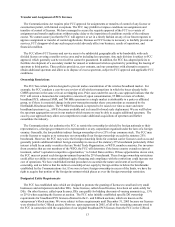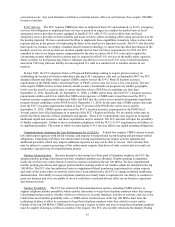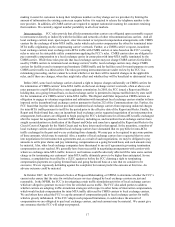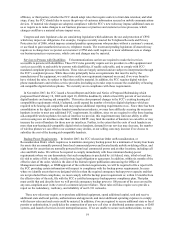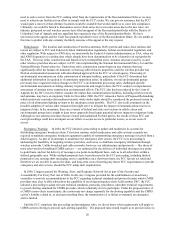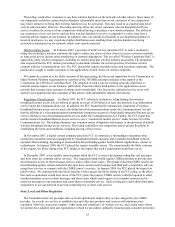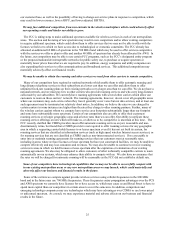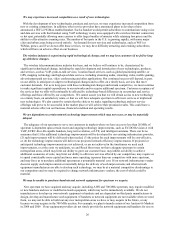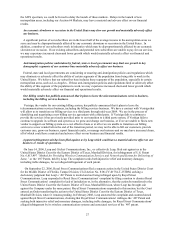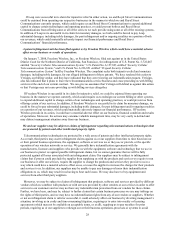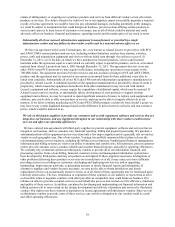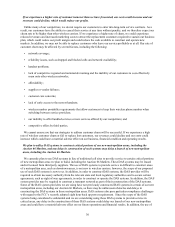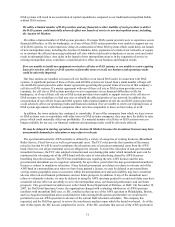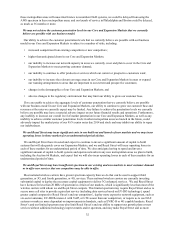Metro PCS 2007 Annual Report Download - page 33
Download and view the complete annual report
Please find page 33 of the 2007 Metro PCS annual report below. You can navigate through the pages in the report by either clicking on the pages listed below, or by using the keyword search tool below to find specific information within the annual report.
22
This ruling, could allow customers to use their wireless handsets on the networks of other carriers. Since many of
our competitors subsidize certain wireless handsets substantially more than we do, customers of our competitors
may find it attractive to bring their wireless handsets to us for activation. This may result in us experiencing lower
costs to add customers. However, this ruling also may allow any of our customers who are dissatisfied with our
service to utilize the services of our competitors without having to purchase a new wireless handset. The ability of
our customers to leave our service and use their wireless handsets to receive a competitor’ s service may have a
material adverse impact on our business. In addition, since our subsidy for handsets to our distribution partners is
incurred in advance, we may experience higher distribution costs resulting from wireless handsets not being
activated or maintained on our network, which costs may be material.
Wireless Open Access. In February 2007, a provider of VoIP services asked the FCC to issue a declaratory
ruling that would give wireless customers the right to utilize any device of their choice to access a wireless network
as long as the device did not cause interference or network degradation. This so-called “Wireless Carterfone Rule” is
opposed by many wireless companies, including us, and the principal wireless industry association. The proponent
also requested that the FCC initiate proceedings to determine whether the current practices of wireless carriers
comport with the Communications Act. The FCC placed this request on public notice and has taken comments. The
petition also sought to enable customers to run applications of their choice on wireless networks.
We cannot be certain as to the likely outcome of this proceeding, but the recent imposition by the Commission of
Open Network Platform requirements on a portion of the 700 MHz spectrum indicates some support at the
Commission for a Wireless Carterfone Rule. The adoption of such a rule for existing networks could have a
material adverse impact on our business, particularly if the rule allows third parties to run applications on our
network that consume large amounts of airtime and/or bandwidth. Our fixed price, unlimited service is not well
suited to such applications and a mandate of this nature could substantially impede our business.
Regulatory Classifications. In March 2007, the FCC released a declaratory ruling finding that wireless
broadband Internet access service offered at speeds in excess of 200 kbps in at least one direction is an information
service under the Communications Act. In addition, the FCC found that the transmission component of wireless
broadband Internet access service meets the definition of telecommunications under the Communications Act and
that the offering of a telecommunications transmission component as part of a functionally integrated Internet access
service offering is not a telecommunications service under the Communications Act. Further, the FCC found that
mobile wireless broadband Internet access service is not a “commercial mobile service” under Section 332 of the
Communications Act. This ruling eliminates any common carrier obligations with respect to the provision of mobile
wireless broadband Internet access services. This ruling could allow our competitors and us greater flexibility in
establishing the terms and conditions, including pricing, of this service.
In November 2007, a digital content company asked the FCC to commence a rulemaking to determine what
constitutes reasonable network management by broadband network operators and to prohibit broadband network
operators from blocking, degrading or unreasonably discriminating against lawful Internet applications, context or
technologies. In January 2008, the FCC placed the request on public notice. We cannot predict the likely outcome
of the request, the likely timing of an FCC ruling, or the impact that such a requirement would have on us.
In December 2007, several public interest groups asked the FCC to issue a declaratory ruling that text messages
and short codes are common carrier services. The requested ruling would require CMRS providers to provide non-
discriminatory access to short message services and to utilize short codes. The groups claim that CMRS carriers are
discriminating against certain customers who may have controversial messages and third party competitors who are
using these services to compete with the CMRS carrier’ s services. In January 2008, the FCC placed the request on
public notice. We cannot predict the likely outcome of the request, the likely timing of an FCC ruling, or the effect
that such a requirement would have on us. If the FCC grants the request, CMRS carriers could be required to allow
nondiscriminatory access to short messages and short codes which could require us to transmit controversial or
unsavory messages to our customers and cause them to terminate service. Such a ruling also could allow third party
competitors to use our network to provide competing text or short code services.
State, Local and Other Regulation
The Communications Act preempts state or local regulation of market entry or rates charged by any CMRS
provider. As a result, we are free to establish rates and offer new products and services with minimum state
regulation. However, states may regulate “other terms and conditions” of wireless service, and certain states where
we operate have adopted rules and regulations to which we are subject, primarily focusing upon consumer protection



